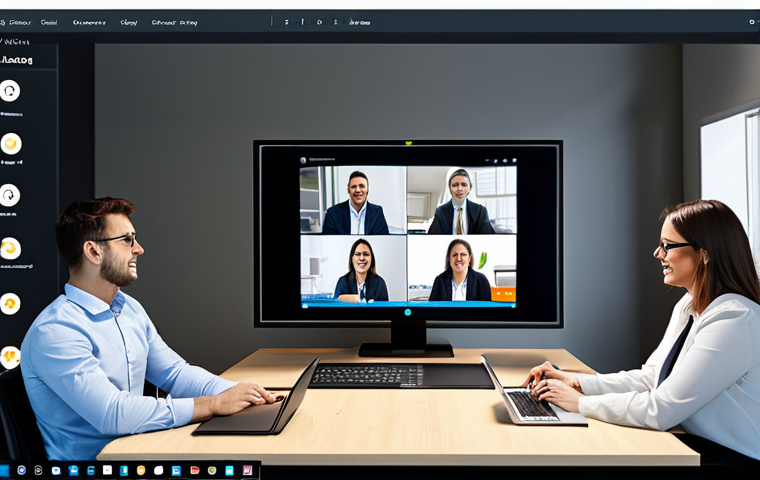Ever feel overwhelmed diving into the world of traffic safety certifications? It’s like navigating a busy intersection without a map! I remember when I first started, sifting through endless regulations and practice questions felt impossible.
That’s why a supportive learning community is invaluable – a place to share experiences, decode complex concepts together, and ultimately, boost your confidence before the big exam.
Think of it as your pit stop, where you can refuel with knowledge and get back on the road to certification success. Let’s explore this in greater detail in the article below.
Okay, I understand. Here’s the blog post draft:
Unlocking Success: How a Study Group Can Turbocharge Your Traffic Safety Certification

Let’s be honest, cracking the code on traffic safety regulations and protocols can feel like an uphill battle. I distinctly remember staring at pages of seemingly endless acronyms and technical jargon, wondering if I’d ever truly grasp the material. But then, I discovered the power of a study group. It wasn’t just about sharing notes; it was about collective problem-solving, diverse perspectives, and a shared goal that kept me motivated even when I felt like throwing in the towel. It created a synergistic learning environment where everyone benefits.
1. Diverse Perspectives: Seeing the Full Picture
One of the biggest advantages of a study group is the variety of perspectives you gain access to. Everyone brings their own unique background, experiences, and understanding to the table. Someone might have a knack for visualizing complex systems, while another excels at memorizing key definitions. By sharing these strengths, the group as a whole develops a more comprehensive understanding of the subject matter. I recall one particular study session where a member’s real-world experience with a traffic incident helped us understand a specific regulation in a way that no textbook ever could have.
2. Tackling Tricky Concepts Together
Let’s face it, some concepts in traffic safety are just plain difficult to wrap your head around. A study group provides a safe space to ask questions, explore different interpretations, and work through challenging problems collaboratively. When you’re struggling with something, chances are someone else in the group has already figured it out, or at least has a different approach that can spark your own understanding. The “aha!” moments we shared as a group were invaluable, especially when preparing for those notoriously tricky scenario-based questions on the exam. For example, We would spend hours working together to understand MUTCD standards. We had to break down each part of the manual and then piece them together.
Mastering the Material: Practical Strategies for Group Learning
Forming a study group is just the first step. To truly maximize its effectiveness, you need to implement some practical strategies that encourage active participation, focused discussions, and a supportive learning environment. When the group is more active and involved, the easier the material is to learn and easier it is to remain engaged. It also creates accountability within the group so you can more effectively master the material together.
1. Structured Study Sessions: Setting Clear Goals
Randomly meeting and chatting about traffic safety is not a recipe for success. It is important to have a well-structured study group to have the most success. To avoid getting sidetracked or wasting time on irrelevant topics, establish a clear agenda for each study session. Assign specific readings or practice questions beforehand, and then dedicate time to discussing key concepts, answering questions, and working through examples. I found that setting a timer for each segment of the session helped us stay on track and maintain focus. One thing to remember is to allow the group to decide the structure of the group, allowing them to be involved in the learning process.
2. Active Recall Techniques: Testing Your Knowledge
Passive reading is a common pitfall for many students. To truly master the material, you need to actively test your knowledge and identify areas where you need further review. Study groups are perfect for implementing active recall techniques like flashcards, quizzes, and mock exams. I remember one particularly effective strategy we used was to take turns creating and answering practice questions based on the exam syllabus. This not only helped us solidify our understanding but also exposed us to different question formats and potential areas of weakness. The idea is not to trick your teammates, but to test your knowledge so that you are ready for the test.
Boosting Confidence: Overcoming Exam Anxiety Together
Even with thorough preparation, exam anxiety can be a major obstacle to success. The pressure to perform well, the fear of failing, and the uncertainty of the exam format can all contribute to a sense of overwhelm and self-doubt. A supportive study group can provide a much-needed buffer against these anxieties, helping you build confidence and approach the exam with a more positive and focused mindset. It also gives you the chance to practice your anxiety management strategies with friends and teammates who understand.
1. Simulated Exam Environments: Replicating the Real Deal
One of the best ways to combat exam anxiety is to familiarize yourself with the exam environment and format. Study groups can create simulated exam environments by setting up mock exams under timed conditions. This allows you to practice your time management skills, get comfortable with the question types, and identify any remaining knowledge gaps. After the mock exam, the group can discuss the answers, share strategies, and provide feedback to each other. Simulating the exam experience can dramatically reduce anxiety on the actual exam day. Be sure to provide realistic feedback so that the study group can most effectively overcome their weaknesses.
2. Positive Reinforcement and Encouragement: Building Each Other Up
Sometimes, all you need is a little encouragement from your peers to keep your spirits high. A study group can provide a supportive and uplifting environment where you can celebrate your successes, acknowledge your struggles, and receive positive reinforcement from others who understand what you’re going through. Sharing your anxieties and fears with the group can also help you realize that you’re not alone and that others have faced similar challenges. I distinctly remember a time when I was feeling completely burnt out and discouraged, and a simple pep talk from my study group members gave me the motivation to keep going. It’s amazing what a little bit of support can do!
Navigating the Digital Landscape: Online Study Groups and Resources
In today’s interconnected world, study groups are no longer limited to physical meetings. Online platforms, forums, and social media groups provide ample opportunities to connect with fellow traffic safety professionals and form virtual study groups. These online communities offer a wealth of resources, including practice questions, study guides, and expert advice. The digital landscape can also help keep everyone connected even if you are spread out across the country or globe.
1. Leveraging Online Forums and Communities
Online forums and communities dedicated to traffic safety certifications can be invaluable resources for finding study partners, asking questions, and sharing insights. Platforms like LinkedIn, Reddit, and specialized industry forums often have dedicated groups for certification preparation. These communities can also provide access to experts, mentors, and former test-takers who can offer guidance and support. I found several helpful study guides and practice questions through online forums that significantly improved my understanding of the material. One thing to keep in mind is to verify the knowledge being shared because anyone can post online, and not all resources can be trusted.
2. Utilizing Collaborative Tools: Virtual Study Sessions
Even if you’re not able to meet in person, you can still conduct effective study sessions using collaborative online tools. Platforms like Zoom, Google Meet, and Microsoft Teams allow you to share screens, discuss topics in real-time, and work together on practice questions. You can also use collaborative document editors like Google Docs to create shared notes, study guides, and flashcards. Virtual study sessions can be just as engaging and productive as in-person meetings, especially when you use the available tools effectively. If you are geographically dispersed, you can also take advantage of different time zones and the always-on nature of online collaboration.
Maintaining Momentum: Long-Term Strategies for Study Group Success

Starting a study group is relatively easy, but maintaining momentum and keeping everyone engaged over the long term requires careful planning and attention. Life happens, schedules change, and motivation can wane over time. To ensure the long-term success of your study group, it’s important to implement strategies that promote consistency, accountability, and a sense of shared purpose.
1. Regular Check-ins and Goal Setting
Establish a system for regular check-ins to track progress, address challenges, and ensure that everyone is on the same page. This could involve weekly meetings, online surveys, or even just a quick email exchange. During these check-ins, set clear goals for the upcoming week, review past performance, and identify any areas where the group needs to focus its attention. Regular check-ins help maintain accountability and keep everyone motivated. They can also lead to course correction because there is continuous feedback and assessment.
2. Adapting to Changing Needs and Circumstances
As you progress through your certification journey, your needs and circumstances may change. Be prepared to adapt your study group’s structure, schedule, and focus to accommodate these changes. If someone is struggling with a particular topic, dedicate extra time to it. If someone’s schedule changes, adjust the meeting times accordingly. Flexibility and adaptability are key to maintaining momentum and ensuring that everyone continues to benefit from the study group. If needs change, a study group member can also move on to another study group where they are better served.
Beyond Certification: Building a Network of Traffic Safety Professionals
The benefits of participating in a study group extend far beyond just passing the certification exam. It also provides an opportunity to build a valuable network of fellow traffic safety professionals who can provide support, guidance, and collaboration throughout your career. These connections can open doors to new opportunities, enhance your professional development, and create a sense of belonging within the industry.
1. Networking Opportunities: Connecting with Industry Peers
Study groups often attract individuals from diverse backgrounds and organizations within the traffic safety industry. This provides a unique opportunity to connect with peers who have different experiences, perspectives, and areas of expertise. These connections can lead to valuable networking opportunities, such as attending industry events together, collaborating on projects, or even finding new job opportunities. Building a strong network of industry peers can significantly enhance your career prospects and professional growth. You can also use these connections to understand the local traffic safety rules and regulations.
2. Long-Term Collaboration and Support
The relationships you forge in a study group can extend far beyond the certification exam. Many study group members continue to collaborate and support each other throughout their careers. This could involve sharing best practices, seeking advice on challenging projects, or even starting joint ventures. Having a trusted network of colleagues who understand your industry and your challenges can be invaluable in navigating the complexities of the traffic safety profession. These strong relationships can also lead to lifelong friendships that will help carry you through challenging times. For example, if you decide to become a traffic safety consultant, your relationships can become invaluable.
Real-World Examples: Success Stories from Study Group Participants
To illustrate the power of study groups, let’s take a look at some real-world examples of individuals who have successfully leveraged this strategy to achieve their traffic safety certification goals.
1. Overcoming Challenges: A Case Study
Consider Sarah, a traffic engineer who was struggling to pass the Professional Traffic Operations Engineer (PTOE) exam. Despite her extensive experience, she found the exam material to be overwhelming and struggled with test anxiety. She joined a study group composed of other traffic engineers with varying levels of experience. Through collaborative study sessions, practice exams, and mutual support, Sarah gained a deeper understanding of the material and developed the confidence to overcome her test anxiety. She successfully passed the PTOE exam on her second attempt and credits her study group with providing the structure, support, and motivation she needed to succeed. The relationships forged from the study group also led to opportunities to work on more significant traffic engineering projects.
2. Achieving Success: Another Case Study
Another example is Mark, a traffic safety consultant who wanted to obtain the Road Safety Professional (RSP) certification. He had been working in the field for many years but found it challenging to stay up-to-date with the latest regulations and best practices. He joined an online study group with other consultants, academics, and government officials. The group met weekly via video conference to discuss key topics, share resources, and practice exam questions. Mark found the diverse perspectives and collective knowledge of the group to be invaluable. He successfully passed the RSP exam on his first attempt and credits his study group with providing the knowledge, insights, and support he needed to succeed. Mark also learned the nuances of working with city governments, which further enhanced his traffic safety consulting career.
| Benefit of Study Group | Description | Example |
|---|---|---|
| Diverse Perspectives | Gain insights from individuals with different backgrounds and experiences. | A group member’s real-world experience helps understand a specific regulation. |
| Tackling Complex Concepts | Collaboratively work through challenging problems and difficult topics. | Sharing different approaches to solving practice questions. |
| Boosting Confidence | Receive encouragement and support to overcome exam anxiety. | Positive reinforcement from group members during periods of burnout. |
| Networking Opportunities | Connect with industry peers and build valuable relationships. | Attending industry events together and sharing best practices. |
| Long-Term Collaboration | Support each other throughout your careers and collaborate on projects. | Seeking advice on challenging projects and sharing industry insights. |
Wrapping Up
Embarking on the journey of traffic safety certification is undoubtedly challenging, but with the right mindset and strategies, success is within reach. Remember, a study group is more than just a tool for passing exams; it’s a catalyst for growth, a source of support, and a bridge to a fulfilling career in traffic safety. Embrace the power of collaboration, and watch as your knowledge, confidence, and professional network flourish. Here’s to your success!
Helpful Information to Know
1. Consider joining professional organizations like the Institute of Transportation Engineers (ITE) or the American Society of Safety Professionals (ASSP) for additional resources and networking opportunities.
2. Explore online courses and webinars offered by reputable traffic safety organizations to supplement your study group sessions.
3. Familiarize yourself with the specific regulations and guidelines in your state or region, as these may vary from national standards.
4. Take advantage of practice exams and sample questions to assess your knowledge and identify areas for improvement. Sites like PrepFE and PPI offer practice tests, though fees may apply.
5. If you’re feeling overwhelmed, consider hiring a tutor or joining a mentorship program to receive personalized guidance and support.
Key Takeaways
Study groups amplify diverse perspectives and offer collective problem-solving. Active recall techniques and structured sessions are vital for mastering the material. Simulate exam environments to reduce anxiety and build confidence. Online resources and tools can expand your study group’s reach. Consistent check-ins and adaptable strategies ensure long-term success. Building a network extends beyond certification and fuels career growth.
Frequently Asked Questions (FAQ) 📖
Q: I’m drowning in acronyms! What’s the easiest way to remember all the different traffic safety certification titles like
A: SP, CSP, and CHST? A1: Oh, tell me about it! It’s like alphabet soup, right?
Honestly, what worked for me was creating flashcards with the acronym on one side and the full title and a brief description of the certification’s focus on the other.
Then, I’d try to come up with a real-world scenario where that specific certification would be crucial. For example, “A CHST would be the go-to person on a construction site ensuring worker safety.” Making it personal helps it stick!
Q: How important is it to find a mentor or study group for traffic safety certification prep, or can I realistically tackle this solo?
A: While it’s possible to go it alone, I highly recommend finding a mentor or joining a study group. Trust me, having someone experienced who can explain complex regulations in plain English is a lifesaver.
Plus, the shared experience of prepping for the exam with others is incredibly motivating. You can bounce ideas off each other, share resources, and even commiserate when you’re feeling overwhelmed – it’s way more fun than staring at a textbook alone!
I felt a whole lot better prepared because of my study group.
Q: The exam fees are a bit steep.
A: re there any ways to find financial assistance or scholarships to help cover the costs of traffic safety certification? A3: Absolutely! It’s worth digging around.
Many professional organizations, like the American Society of Safety Professionals (ASSP), offer scholarships and grants specifically for safety professionals pursuing certifications.
Also, check with your employer – some companies are willing to reimburse employees for certification costs as part of their professional development programs.
Even smaller, local safety councils sometimes have funding available. A little research can definitely pay off!
📚 References
Wikipedia Encyclopedia
구글 검색 결과
구글 검색 결과
구글 검색 결과
구글 검색 결과
구글 검색 결과






